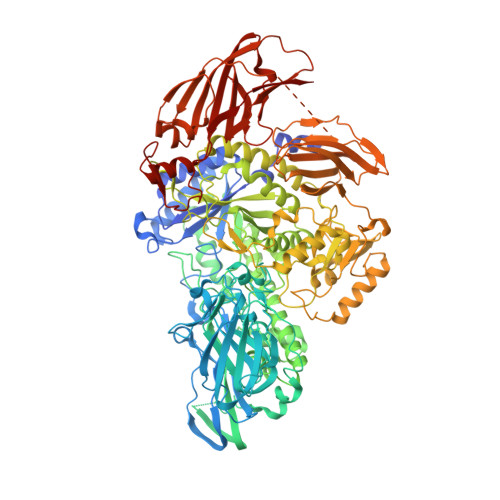Complex pectin metabolism by gut bacteria reveals novel catalytic functions.
Ndeh, D., Rogowski, A., Cartmell, A., Luis, A.S., Basle, A., Gray, J., Venditto, I., Briggs, J., Zhang, X., Labourel, A., Terrapon, N., Buffetto, F., Nepogodiev, S., Xiao, Y., Field, R.A., Zhu, Y., O'Neill, M.A., Urbanowicz, B.R., York, W.S., Davies, G.J., Abbott, D.W., Ralet, M.C., Martens, E.C., Henrissat, B., Gilbert, H.J.(2017) Nature 544: 65-70
- PubMed: 28329766
- DOI: https://doi.org/10.1038/nature21725
- Primary Citation of Related Structures:
5MQM, 5MQN, 5MQO, 5MQR, 5MQS, 5MSX, 5MSY, 5MT2, 5MUI, 5MUJ, 5MWK - PubMed Abstract:
The metabolism of carbohydrate polymers drives microbial diversity in the human gut microbiota. It is unclear, however, whether bacterial consortia or single organisms are required to depolymerize highly complex glycans. Here we show that the gut bacterium Bacteroides thetaiotaomicron uses the most structurally complex glycan known: the plant pectic polysaccharide rhamnogalacturonan-II, cleaving all but 1 of its 21 distinct glycosidic linkages. The deconstruction of rhamnogalacturonan-II side chains and backbone are coordinated to overcome steric constraints, and the degradation involves previously undiscovered enzyme families and catalytic activities. The degradation system informs revision of the current structural model of rhamnogalacturonan-II and highlights how individual gut bacteria orchestrate manifold enzymes to metabolize the most challenging glycan in the human diet.
- Institute for Cell and Molecular Biosciences, Newcastle University, Newcastle upon Tyne NE2 4HH, U.K.
Organizational Affiliation:




















